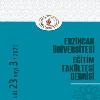The Structural Composition of The Projective Competence
The Structural Composition of The Projective Competence
___
- Bastian, J. (1993). Freiarbeit and project-based teaching / a didactic of "reunification". Pedagogy, 10, 6-9.
- Böhm, I., Schneider, J. & Others. (1995). Productive learning and educational opportunity for young people in Europe. Ingrid Böhm & Jens Schneider. IPLE. Schibri-Verlag, Berlin-Milow, 122.
- Cook, R. and Weaving, H. (2013). Key competence development in school education in Europe: KeyCoNet’s review of the literature: A summary. Brussels: European Schoolnet.
- Derevitskaya, A. V. (2011). Theoretical aspects of the development of art and projective competence of college students. Chelyabinsk, 67.
- Deist, F. D. & Winterton, J. (2005). Human resource development international. Electron Resource, Vol. 8. No. 1, 27-46, March. Access mode: http://www.abccba. ru/abc68.php.
- Frolov, V. N. (2015). Social and creative professional competence of the graduates of a humanitarian profile [Text]. V. N. Frolov. Innovative Pedagogical Technologies: Materials Of The Ii International Scientific Conference (Kazan, May 2015). Kazan: Book 2015. 203-210.
- Heldman, K. (2007). Management of the projects. Moscow: DMK Press. 352.
- Kolomiyets, S. M. (2010). The creative competences of students of social and economic specialties: monograph / S. M. Kolomiyets. Moscow: Pero, 181.
- Kormakova, V. N. (2011). The formation of the projective competence in future experts of clothes design. V. N. Kormakova, T. M. Shcheglov. Secondary Professional Education. 10, 18-21.
- Matyash, N. V. & Volodina, Y. A. (2011). The method of the assessment of the projective competence of the students. Digital Scientific Journal, No. 3 (17).
- Medvedev, P. N. (2011). The formation of the projective-technological competence of the graduates in the course of modeling teaching. The abstract of a Thesis of the Candidate of the Pedagogical Sciences: 13.0008. Tula. 25.
- Mukhatayeva, D. I., Bulatbayeva, A. A., Kassen G. A., Aitbayeva, A. B. & Seilkhanova, M. E. (2016).
- The content and the componential structure of the projective competence. The Social Sciences - Medwell Journals, Volume: 11, Issue: 16, 3864-3870.
- Pacific Policy Research Center. (2010). 21st century skills for students and teachers. Honolulu: Kamehameha Schools, Research & Evaluation Division.
- Parfyonova, T. A. (2015). The formation of the projective competence of future teachers in the conditions of professional education. Education and Health Care, No. 1 (3). 61-65.
- Pintosevich, I. (2014). Be effective! Efficiency from A to Z. Moskow: Eksmo. 208.
- Polat, E. S., Yu, M., Bukharkina, Moiseyeva, M. V. & Petrov, A. E. (2009). New pedagogical and informational technologies in the system of education: the manual for the students of the higher educational institutions. Under the editorship of E. S. Polat. 4th issue. Moscow: Publishing center "Academy". 272.
- Verbitsky, A. A. (2010). Contextual and competence-based approach of education modernization. The Higher Education in Russia, No. 5, 32-37.
- What is Project-based Learning? [Online]. (2014). Available: http://bie.org/about/what_pbl [26 June, 2014]. BIE (2014b). 26 June, 2014 Project Search [online]. Available: http://bie.org/project_search
- Yayın Aralığı: 4
- Başlangıç: 1999
- Yayıncı: Erzincan Binali Yıldırım Üniversitesi
Öğretmen Adaylarının Uzaktan Eğitime Yönelik Tutumlarının Bazı Değişkenler Açısından İncelenmesi
Kürşat YENİLMEZ, M Zafer BALBAĞ, Melih TURGUT
İlköğretim Matematik Öğretmeni Adaylarının Matematiksel Akıl Yürütme Becerisi Üzerine Görüşleri
Sınıf Tekrarı Yapan Öğrencilerin Akademik Erteleme Nedenleri
Mehmet KANDEMİR, Müjdat AVCI, Tahsin İLHAN, Mehmet PALANCI
Osmanlı’dan Cumhuriyet’e Hoşgörü: 7. Sınıf Öğrencilerinin Farkındalıkları Üzerine Bir Değerlendirme
Ortaokul Öğrencilerinin Problem Alanlarının Belirlenmesi (Bursa Örneği)
Mehmet Akif ERDENER, Fahri SEZER, Erdoğan TEZCİ
Öğretmen Adaylarının Olasılık Konusuna İlişkin Hata Yaklaşımları
Merve ÖZKAYA, Ömer DEMİRCİ, Alper Cihan KONYALIOĞLU
Sosyal Fobinin Yordayıcıları Olarak Beden İmajı Ve Benlik Saygısı
Namık Kemal HASPOLAT, Mücahit KAĞAN
Yansıtıcı Yeterliliğin Yapısal Kompozisyonu
Mehmet ÖZBAŞ, Dinara MUKHATAYEVA, Aigulim AITBAYEVA, Gulmira KASSEN
Sabriye SEVEN, Alime KIZILKAYA
Türkçenin Zenginliği ve Ana Dili Bilincinin Ortaokullarda Kazandırılması: 5. Sınıf Örneği
